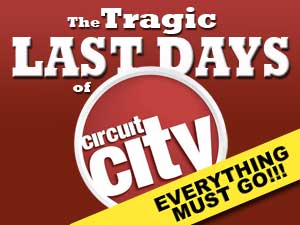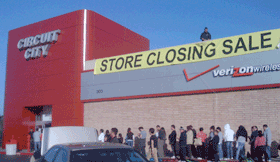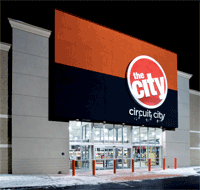![]() Recently, I made a shopping trip to my local Office Depot (which is, incidentally, two storefronts down from the Circuit City I’ve been haunting). While I waited for the mysteriously absent manager to resurface (she was the only person with a key to the room where they stored the copy of TurboTax I was trying to buy), I noticed a sign neatly tacked up above each register, in plain view not only of the cashiers but of customers.
Recently, I made a shopping trip to my local Office Depot (which is, incidentally, two storefronts down from the Circuit City I’ve been haunting). While I waited for the mysteriously absent manager to resurface (she was the only person with a key to the room where they stored the copy of TurboTax I was trying to buy), I noticed a sign neatly tacked up above each register, in plain view not only of the cashiers but of customers.
Tag Archives | Retailing
Specs: Not Meaningless. But Getting There.
 [NOTE: Here’s a post that first appeared in our free T-Week newsletter, which you can subscribe to here.]
[NOTE: Here’s a post that first appeared in our free T-Week newsletter, which you can subscribe to here.]
Once upon a time, I could quote every major speed and feed associated with each computer I owned from memory. I knew the CPU’s clockspeed and how much RAM I had; I knew how much memory the graphics card held and what my screen resolution was; I knew how much hard disk space I had, and how fast the CD-ROM drive was. That was just the beginning. come to think of it: I could also tell you how many megabytes were free on the hard drive, and–in the days of DOS, at least–how much free memory I had once the PC had booted. All of this made sense–every spec had a meaningful impact on my everyday productivity.
Today? I’m not saying I ignore specs–I do pay some attention when I’m making a major investment in new stuff. But I don’t obssess over them like I once did. I’m too busy thinking about other factors which play at least as big a role in determining whether I’ll be pleased with my tech investments.
6 comments
The Last Will and Testament of Circuit City
 For Circuit City, it passed for good news: On Friday, a press release trumpeted the “record shopper turnout” at the failed retailer’s going-out-of-business sale and said that the liquidation proceedings were ahead of schedule. All U.S. stores are therefore closing forever as of tomorrow. And so I made what will almost certainly be my last visit ever to my local Circuit City today, six days after I found it had been reduced to selling used cleaning supplies. Back on Monday, it still stocked some factory-fresh consumer electronics products, too–albeit at discounts too low to send anyone into a shopping frenzy. Today, with 24 hours to go, very little worth buying at any price was still available…
For Circuit City, it passed for good news: On Friday, a press release trumpeted the “record shopper turnout” at the failed retailer’s going-out-of-business sale and said that the liquidation proceedings were ahead of schedule. All U.S. stores are therefore closing forever as of tomorrow. And so I made what will almost certainly be my last visit ever to my local Circuit City today, six days after I found it had been reduced to selling used cleaning supplies. Back on Monday, it still stocked some factory-fresh consumer electronics products, too–albeit at discounts too low to send anyone into a shopping frenzy. Today, with 24 hours to go, very little worth buying at any price was still available…
After the jump, a final set of fuzzy iPhone photos from the scene of the sale. I wonder how long it’ll take the landlord to fill the space, and what will replace Circuit City there–and in the 566 other storefronts that the chain’s failure leaves without a tenant?
69 comments
The Tragic Last Days of Circuit City
 Liquidation: It’s an ugly word for the ugly process of shutting down a retailer by selling off stuff little by little until there’s nothing left that anyone’s going to buy at any price. And my most recent visit to my local branch of the soon-to-be-defunct Circuit City in the Bay Area was…ugly. Literally. The place, which says it’s down to its final week of business, was in gloomy disarray–one part rummage sale, one part junk closet, and barely recognizable as the splashy consumer-electronics merchant that has been around for sixty years. And the bargains still weren’t exciting enough to attract more than a trickle of shoppers. After the jump, a bunch of photos I snapped with my iPhone.
Liquidation: It’s an ugly word for the ugly process of shutting down a retailer by selling off stuff little by little until there’s nothing left that anyone’s going to buy at any price. And my most recent visit to my local branch of the soon-to-be-defunct Circuit City in the Bay Area was…ugly. Literally. The place, which says it’s down to its final week of business, was in gloomy disarray–one part rummage sale, one part junk closet, and barely recognizable as the splashy consumer-electronics merchant that has been around for sixty years. And the bargains still weren’t exciting enough to attract more than a trickle of shoppers. After the jump, a bunch of photos I snapped with my iPhone.
30 comments
Toys R' Us Toying With Used Game Sales
 When it comes to buying and selling used video games, Gamestop has failed to win me over. The store pays criminally low rates for used games, especially recent releases, and it’s all the more infuriating when you see that same game sold back again for more than double what you’re offered. A couple of weeks ago, the store quoted me roughly $25 to buy back Afro Samurai, which is currently sold used for $55.
When it comes to buying and selling used video games, Gamestop has failed to win me over. The store pays criminally low rates for used games, especially recent releases, and it’s all the more infuriating when you see that same game sold back again for more than double what you’re offered. A couple of weeks ago, the store quoted me roughly $25 to buy back Afro Samurai, which is currently sold used for $55.
Any competition is welcome in my book, so I hope Toys R’ Us’ experiments with buying and selling used games works out. Joystiq confirmed today that the toy giant is trying the idea in “a couple of New York stores,” according to a company rep, not including the Times Square location. Another blogger spotted one of the stores in Nanuet, N.Y.
Details are scarce, because Toys R’ Us doesn’t like talking about its test runs, and at present no one is saying how the rates compare to Gamestop. Still, as Joystiq points out, used game sales account for 42 percent of Gamestop’s profits, and sales are expected to reach $2 billion this year. If another major retailer wants to step in on that turf, so be it. As much as it pains me to buy video games from a toy store (you know, the infantilization thing), I can’t argue with saving a few bucks these days.
For now, I’m selling my games back through Gamefly, the mail-order rental service, which offers solid trade-in rates towards the cost of a subscription. Used game sale prices are also better with the service, to the point that you can buy a game with the money from two used ones and still have some leftover credit. Two used games would rarely, if ever, cover a $55 purchase at Gamestop.
One comment
Can’t Anyone Do Tech Retailing Right?
 These are strange times for the retailing of computers and other technology products. Some of the most venerable and best-known names in the business are going out of business, or severely contracting: Sixty-year-old Circuit City is much of the way through the liquidation sale that will end with the closure of all its U.S. stores, a year after CompUSA nearly died before being acquired by TigerDirect and retreating to the U.S. southeast. That leaves Best Buy as the sole nationwide, full-service retail outfit focused on the selling of a wide variety of consumer electronics products. (I’m counting RadioShack as being something less than a full-service retailer, given the limited floor space of its outlets and its emphasis on accessories, cables, and other odds n’ ends.)
These are strange times for the retailing of computers and other technology products. Some of the most venerable and best-known names in the business are going out of business, or severely contracting: Sixty-year-old Circuit City is much of the way through the liquidation sale that will end with the closure of all its U.S. stores, a year after CompUSA nearly died before being acquired by TigerDirect and retreating to the U.S. southeast. That leaves Best Buy as the sole nationwide, full-service retail outfit focused on the selling of a wide variety of consumer electronics products. (I’m counting RadioShack as being something less than a full-service retailer, given the limited floor space of its outlets and its emphasis on accessories, cables, and other odds n’ ends.)
And yet Microsoft has just announced plans to open its own stores and help other sellers promote Microsoft products, presumably inspired in part by the phenomenal, unexpected success of the Apple Stores. You gotta think, however, that the company isn’t diving into technology retailing because the market is booming so much as because it’s so anemic. My guess is that Microsoft figures that the computer merchants of America are doing a mediocre job of explaining its products, and that it must therefore step in and try to get it right. Just like Apple did when it decided to play storekeeper a few years ago.
On some level, it would have been more startling if CompUSA and Circuit City had thrived than if they’d fallen on hard times. The history of consumer-electronics retailing in America is pock-marked with once-famous names that were forced to call it quits. And even though the currently dismal state of the economy may have dealt Circuit City may have dealt Circuit City its death blow, I can’t help but come back to one depressing thought: Circuit City collapsed because it didn’t do enough to earn the loyalty of busy, intelligent shoppers. And neither did the majority of electronics retailers that have ever existed. Their failure to do so inevitably led to their failure, period.
9 comments
A Microsoft Store? Um Isn’t That Kind of Like a Procter & Gamble Store?
 My colleague David Worthington reported on Thursday of Microsoft’s plans to open retail stores. I wanted to mull over the prospect before I said anything. It’s tempting to make fun of the concept–my PC World buddies and some PCW readers did a good job of that here–but I didn’t want to be impulsively snarky, or to come to any definitive conclusions about an idea that nobody (including Microsoft) knows all the details of just yet.
My colleague David Worthington reported on Thursday of Microsoft’s plans to open retail stores. I wanted to mull over the prospect before I said anything. It’s tempting to make fun of the concept–my PC World buddies and some PCW readers did a good job of that here–but I didn’t want to be impulsively snarky, or to come to any definitive conclusions about an idea that nobody (including Microsoft) knows all the details of just yet.
But as I’ve thought it over, I keep coming back to one thought. The Apple Stores work because Apple makes a limited, consistent, well-integrated set of products that make sense sitting on one set of store shelves. Microsoft doesn’t–its wares are vastly larger in number, far broader in mission, and less tied to each other. The company is a technology conglomerate in a way that Apple isn’t, and the notion of an all-Microsoft retail establishment makes me think of a Procter & Gamble store that sells Charmin, Pampers, Tide, Crest, Gillette Fushion razors, and Pringles chips under one roof.
20 comments
Circuit City Under Siege
 They’re the grim reapers of failing retail chains, except they brandish going-out-of-business signs instead of scythes. And they were surrounding the Circuit City a couple of miles from my house today, which, like the rest of the company’s 500+ U.S. stores, is liqidating its stock as the company goes out of business. When I drove up to the store, I was startled to find a long line of customers waiting to get in, snaking all the way to the Sports Authority next door–maybe the longest such line I’ve ever seen that wasn’t at a store with a fresh batch of iPhones or Wiis. (I sure never saw lines like it when CompUSA, Good Guys, and other defunct chains held their liquidation sales–but perhaps today’s economic climate is leaving shoppers obsessed with finding bargains.)
They’re the grim reapers of failing retail chains, except they brandish going-out-of-business signs instead of scythes. And they were surrounding the Circuit City a couple of miles from my house today, which, like the rest of the company’s 500+ U.S. stores, is liqidating its stock as the company goes out of business. When I drove up to the store, I was startled to find a long line of customers waiting to get in, snaking all the way to the Sports Authority next door–maybe the longest such line I’ve ever seen that wasn’t at a store with a fresh batch of iPhones or Wiis. (I sure never saw lines like it when CompUSA, Good Guys, and other defunct chains held their liquidation sales–but perhaps today’s economic climate is leaving shoppers obsessed with finding bargains.)
I joined the line, and got the impression that other folks had joined it in part because they saw a line and figured it was worth joining. (Or at least the woman behind me seemed unclear on the concept–she asked what was going on in the store, and why were were all queuing up.)
A CNet reporter said he found “pandemonium” inside a Southern California Circuit City; this one, just to the south of San Francisco, was relatively sedate inside. Actually, there were fewer people in line to buy stuff than I usually see at Best Buy on a Saturday afternoon. The store felt downright lonely, in part because it was full of staffers who knew they were about to be unemployed, tables of open-box merchandise, items scattered in the aisles, and TVs forlornly playing a video loop arguing that you should buy a TV from Circuit City because of its great post-purchase service.
It was easy to tell why so few people were filling their carts with gear: The deals to be had were far from spectacular. The signs outside promised “Up to 30% OFF,” but a more direct claim would have been something along the lines of “Most hardware 10 percent off, software 20 percent off, and good luck if you find anything in the store that’s 30 percent off.” If your goal was to get the best possible price, you could probably beat even Circuit City’s liquidation prices without trying very hard by going online. Which is presumably one reason why Circuit City was forced into bankruptcy in the first place.
If Circuit City’s liquidation follows the usual pattern, the discounts will get larger as the shelves grow barer, and within a few weeks the stores will be left with items that you don’t want to buy even at 80 percent off. After the jump, some bad iPhone photos from my visit, which left me melancholy about the death of the 60-year-old merchant even though I was never a big fan in the first place.
21 comments
Circuit City Closes Up Shop Once and For All
 It’s hardly surprising, but now it’s official: Troubled consumer-electronics merchant Circuit City has failed to find a buyer and will therefore be liquidating all its stores. It’s lousy news for its more than 30,000 employees, its stockholders, and anyone who was a fan of the chain, which started with a single store six decades ago.
It’s hardly surprising, but now it’s official: Troubled consumer-electronics merchant Circuit City has failed to find a buyer and will therefore be liquidating all its stores. It’s lousy news for its more than 30,000 employees, its stockholders, and anyone who was a fan of the chain, which started with a single store six decades ago.
Even if the U.S. economy was in better shape, the odds were against the company–and, for that matter, anyone else who tries to operate a big chain of electronics stores. Far more of them have folded over the years than have ever been viable businesses. Running successful retail stores is by definition really hard, and the intense price competition among gadget sellers makes squeezing out a profit incredibly tough.
Even so, Circuit City’s death strikes me as largely self-inflicted: For too long, its stores were joyless places with limited selections, uncompetitive prices, and mediocre customer service. It even had an organized program to fire staffers who were experienced enough to know what they were doing and replace them with clueless, low-clost newbies.
With Circuit City’s imminent disappearance, the country is really left with only one nationwide full-service electronics chain, Best Buy. It’s long played Gallant to Circuit City’s Goofus, and should ride out the recession in decent shape. Other electronics purveyors are specialists (RadioShack), generalists with an electronics department (Wal-Mart, Target), regional (Fry’s, the current incarnation of CompUSA), or willfully limited in number of locations (Micro Center). Or, of course, completely virtual (Amazon.com, Buy.com, etc., etc., etc.).
Among the reasons I wish that Circuit City had made it is this: It would be a lot better for consumers if there were at least two strong national chains competing to win customers through broad product selection, low prices, and decent service. Best Buy has enough competition and challenges on other fronts that I don’t expect it to grow too fat and happy, but it no longer has to worry about its most direct rival.
Of course, if Best Buy’s management is smart–and it is–it’ll continue to run scared. Jim Collins’ business bestseller, Good to Great–published in 2001–lavishes praise on Circuit City as one of the country’s best-run companies of any sort. It took Circuit City only eight years to go from glory to death. Bottom line: Best Buy could be dead in a decade too, if it doesn’t make its customers happy…
